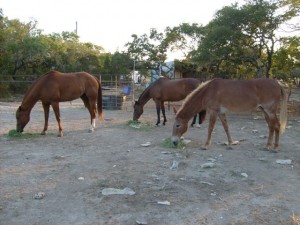Ever wonder why your horse that gets the “perfect” food and care needs more to eat to maintain weight and your neighbor’s horse that gets a no extra care seems fat and happy? Well one of my good friends asked me this question and I had to get a bit more information before I could give an answer.
For instance what did she mean by fat and happy? It turns out the neighbors horses are fat on half the feed my friend gives but they are not so happy. Their hair coats are pretty course and they have chronic runny eyes. One of the horses that is not that old is already developing signs of cushings.
My friend’s horses on the other hand have beautiful hair coats and no signs of chronic problems such as runny eyes. If one of my friend’s horses gets and injury the healing is fast and with little scarring. On the other hand, her neighbor’s horses always need antibiotics for even small scratches and often heal with ugly scars.
My friend was observing that when the weather turns cold her horses lose weight quickly if she does not give extra feed but the neighbor’s horses stay fat even though they shiver from the cold. After a bit of thought it came to me that the difference is whether a horse is surviving or thriving.
A horse in survival mode will have a slower metabolic rate in order to conserve energy but this does not come without cost the his overall, long term health. Horses have a mechanism to survive starvation and it is to go into a state of insulin resistance. This is a stress response that wrecks havoc on their hormone system if it is allowed to go on for an extended period of time.
Wild horses and donkeys use insulin resistance to survive when food is scarce but they will shift out of this state when food supplies increase. Feeding a horse less than what is needed for optimum health on a continuous basis will cause the insulin resistance to become permanent. When a horse becomes insulin resistant he loses the ability to properly metabolize carbohydrates and his hormone systems no longer function properly.
An insulin resistant horse will stay fat on almost no food at all but immune function decreases and laminitis is likely to develop. I suspect this is what my friend is seeing in the neighbor’s horses. I have always stresses the route of prevention of problems and good nutritional supplements such as packets of bluegreen algae, probiotics and enzymes or powdered algae and probiotic blend. These and other good whole food supplements are like having health insurance on your horse. Yes they cost money but like most things you can pay now to prevent problems or later to fix them. I prefer to see my horses thrive now. Madalyn

Thriving horses and 28 year old Tess
For more on insulin resistance check out my Laminitis, Cushings, Insulin Resistance ebook .